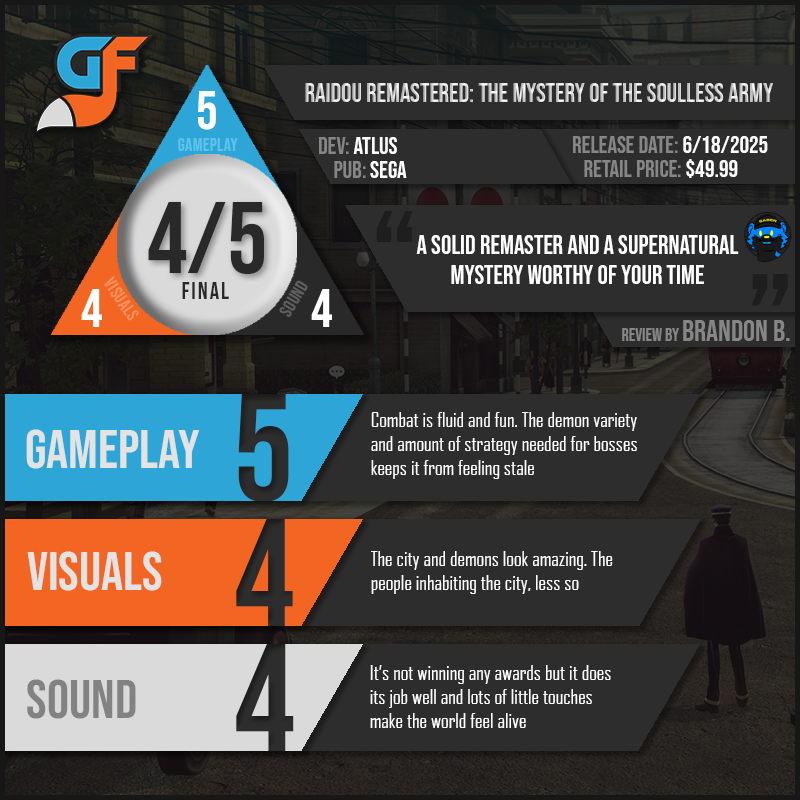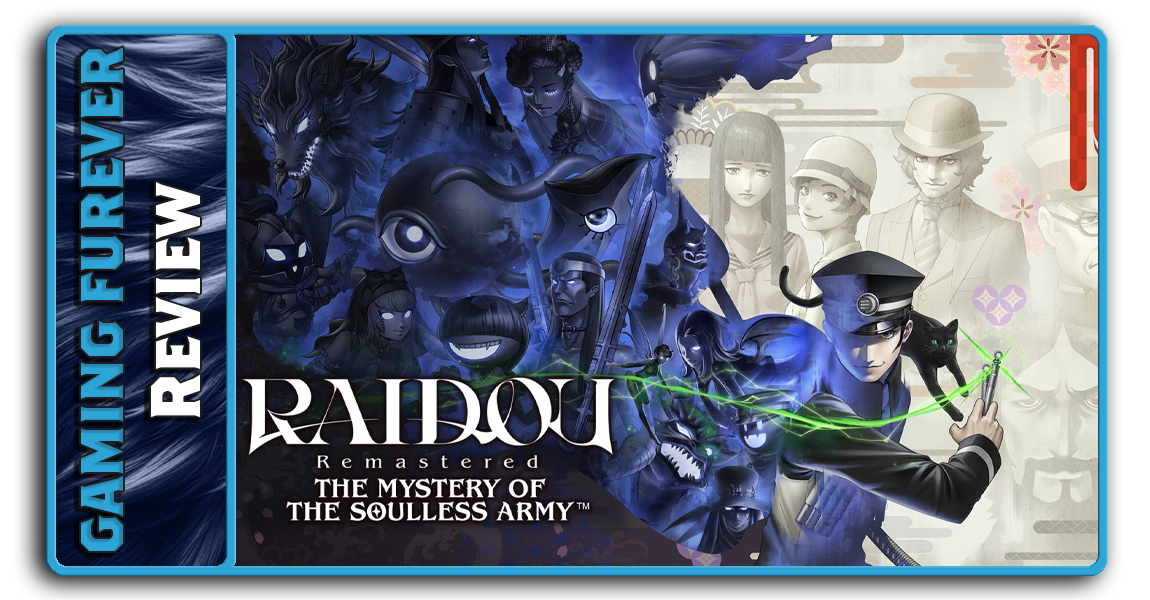I need to make a confession: I have never played an Atlus game before. I’ve certainly heard of them and am familiar with their reputation. It’s hard to exist in the video game space without the name Persona 5 coming up at least once. Metaphor ReFantazio, one of their most recent projects, released less than a year ago to critical acclaim. Garnering numerous accolades and being praised for its story and well designed characters. Even the most successful companies start somewhere though, and it’s interesting to take a look back at that history. Either out of curiosity due to the recent hits, or because a remaster of a lesser known title makes its way into the spotlight. Enter Raidou Remastered: The Mystery of the Soulless Army.
As the name implies, Raidou Remastered is a remaster of Devil Summoner: Raidou Kuzunoha vs The Soulless Army, which was originally released in 2006 for the PS2. The original itself was the third entry in Devil Summoner series, a sub-series of the Shin Megami Tensei franchise. Despite that, Raidou was the first of that series to receive an international release. Raidou received mostly positive or mixed reviews, with much of the praise being directed at its story and demons. Since I never played the original, I can’t speak to how well the remaster improves upon it. But as far as how well it holds up today, I’d say it holds up pretty well.
Raidou Remastered puts players in the shoes of Raidou Kuzonoha XIV, the latest in the Raidou Kuzonoha line of Devil Summoners. As Raidou Kuzonoha, you capture and use demons to combat supernatural threats to the Capitol(A fictionalized Tokyo). As a cover, you also work for the Narumi Detective Agency, which accepts “unusual” cases. One of these cases kicks off the plot as a mysterious girl comes to the agency requesting they kill her shortly before she gets kidnapped. That’s just the tip of the iceberg as far as this plot is concerned. The mystery only deepens as you investigate the girl and conspiracy surrounding her. Fortunately, Raidou won’t have to investigate alone. The mysterious black cat Gouto is around to give advice and remind Raidou of where to go. Plus, Raidou can make use of the various demons he encounters.
There’s over 120 different demons to find, capture and fuse. All of them pulling from various mythologies and folklores. From adorable Jack O’ Lanterns to the wolf Fenrir itself, there’s quite a few to meet. Each of these demons belongs to one of nine different orders. Seven of these orders have different associated investigation skills that Raidou can make use of. For example, Pyro Order demons like Ukobach can “Ignite” an NPCs emotions, making them more passionate and causing them to let more info slip. On the other hand, a Frost Order demon like Azumi can “Cool Down” an NPC to calm them, or a Pegan Order demon like Inugami can let Raidou read minds. There’s benefits to keeping demons of various orders on hand. The other two orders, Element and Mitama, have benefits specific to fusion(more on that in a bit). As you progress, Raidou will be able to have more demons with him though only two can join him in battle.
Speaking of, battles in Raidou Remastered are handled quite differently from its siblings. Being an action RPG means combat is real time instead of turn based, so it ends up feeling more like a Souls game with the amount of dodging and moving you need to do. Fortunately, you can also pause these battles to inspect enemy weaknesses and issue commands or swap out demons. I appreciate having to consider what attacks I should use and needing to learn boss patterns to handle the encounters effectively. Raidou has a number of tools, from a melee weapon, to his gun for more skittish enemies and elemental attacks to exploit the aforementioned weaknesses. It helps immensely to keep the game from feeling like a monotonous button masher. Demons fight alongside Raidou in these encounters and you can decide if you want them to be able use their skills on their own or not. Skills require MAG(which can be replenished through light attacks) to use and so it might be better to be more conservative in some fights. Fortunately I was generally fine leaving skills on for most of it.
In typical RPG fashion, completing battles awards experience which lets Raidou and his demons level up. As demons level up, they gain new skills which can later be passed on through fusion. Fusing demons together can result in new, more powerful demons for Raidou to command. Two special orders are exclusive to fusion: Element(obtained by fusing two demons of the same order) and Mitama(obtained by fusing two element order demons). Different demon combinations result in different types of demons which encourages some experimentation. You can even keep multiple demons of the same type if you have specific goals in mind. If the demons are at max loyalty(which builds up from battling together), then they can also pass on unlocked passive skills. This lends itself wonderfully to a very customizable roster. Items like skill books allow for an alternative means of learning new skills. There’s plenty to mess around with and discover.
The demons are pretty varied with quirky designs all around and even bits of personality through occasional dialogue. This works well with the Tokyo inspired setting. Set in a time when tradition meets western influence, the dichotomy between the past and the future is an ever present one in this game. I enjoyed the environments, from the shrines to the more metropolitan city areas. They did a good job of making The Capitol look like it's in a transitional period. The Dark Realm on the other hand, lives up to its name. Taking that same city and giving a dark and tense atmosphere along with being deserted is a good sign things are getting serious. As lovely as the environments and the demons look, the characters themselves are more hit or miss. I understand that it’s a remaster of a PS2 game, so I can’t fault it too heavily, but the character models here are a bit too PS2 era in my opinion. Some, like Raidou and Narumi, look fine. Others like the butler Nakamura look unsettling and not in a good way. The close-ups that happen when initiating dialogue with key characters makes it worse. I would’ve preferred 2D artwork like Persona or Metaphor instead.
At least the soundtrack is pleasant to listen to. While I won’t be humming any of the ost any time soon, the tracks suit their purpose well. From the classy detective theme that plays in the agency, to the battle music, nothing overstays its welcome. A nice touch added with the remaster is voice acting. Every key character has fully voice acted dialogue and it goes a long way toward making the world and its characters feel more alive. Even the demons have little bits of voice acting, it’s cute to hear one call “Raidou!”.
Raidou Remastered is a pretty fun time, and for my first Atlus game, I did enjoy it. Of course I’m partial to the detective aspect of it as I adore mysteries and diving into the Mystery of the Soulless Army kept me throughly engaged. Less mysterious is how it all comes together. The remaster boasts numerous improvements over the original, from updated combat to additional demons(some introduced as recently as Shin Megami Tensei V) and adding a detective journal for updates as well as case file sidequests to keep players busy. Complete with quirky humor and a fairly memorable cast, even older fans who are familiar with Raidous first outing should be pleased. Give this one a try. It’s a mystery worth solving.




